- Home
- M. L. Buchman
Twice the Heat
Twice the Heat Read online
Twice the Heat
an Oregon Firebirds romance
M. L. Buchman
Sign up for M. L. Buchman’s newsletter today
and receive:
Release News
Free Short Stories
a Free book
* * *
Do it today. Do it now.
http://free-book.mlbuchman.com
1
Going in.”
“On your tail, bro,” Amos followed close behind Drew’s helicopter. “We’re like stooping pigeons nailing those breadcrumbs.”
“That’s ‘stooping hawks,’ you dweeb. And those are fifteen hundred degree breadcrumbs.” Drew carved an arc and dumped his load of water from the MD 520N’s belly tank. Two hundred gallons sheeted down the front of the already burning house.
“But we’re super brave pigeons.” With most of the burning cedar doused for the moment—what doofus shingled with cedar and didn’t keep the forest cut back from his house—Amos decided to dump his own fifteen hundred pounds of water across the burning trees that had ignited the front of the house in the first place.
“I’m a brave hawk anyway,” Drew Shaw offered up one of his laughs on their private helo-to-helo frequency. “You, Berkowitz, just can’t help following me along wherever I go, like the sad Brooklyn pigeon you are.”
Now that was playing dirty. “Just making way for your monster Upper West Side ego, bro.”
“Yes, some of us are just superior and know it.”
Amos considered a couple of different response ploys, but none of them were going to pan out well. Drew was hard to knock down because he was a dashingly handsome black guy with a big smile and a clean-shaved scalp that shone in the sunlight or in the bars. Maybe he waxed it at night. Amos was always the frumpy Jewish sidekick with too much dark curly hair.
So, he let Drew have the round and focused on his flying.
Thankfully this house and the next had big swimming pools. Amos slid over his chosen pool and lowered the snorkel hose from his hovering helo. He hit the pump switch and sighted along the house’s second-story deck to hold his altitude while he loaded up. His helo could suck up its own weight in water in under twenty seconds.
“Sure I follow you, Drew. Someone’s got to clean up your poo.” The FCC got pissy if you said “shit” over the radio—or even “pissy” for that matter. Really cramped a guy’s style. What heli-aviation firefighter said “poo”?
It made the rebuttal doubly weak—both late and lame. Drew didn’t even deign to answer. Instead, he just flashed one of those lady-killing smiles at him from where he hovered above the next pool over.
Twenty seconds later, Amos killed the pump switch, and lifted high enough to clear the house and return to its front yard. Sometimes they had to fly five or even ten minutes to find a water source. With those constrictions, the little MD 520Ns were of little use. Luckily this part of the wildfire was moving into a well-pooled neighborhood—bad for the neighborhood, but good for them. Saving houses was what the little helos of the Oregon Firebirds did best.
All six were aloft today, but the wildfire’s front was such a mess that they’d split into three teams of two instead of their more typical two-of-three arrangement. These houses were on large plots of one and two acres, most with little attention to the wildland-urban interface they were creating. That meant that when a wildfire lit up the forest, it had a tendency to light up the houses as well.
The shared command frequency was quiet. After a long summer and most of fall, the Firebirds all knew their task sequence like it had been hardwired into their nervous system. Tank up. Douse each structure (burning or not) to soak it down. Don’t fight the fire to a standstill—wasn’t going to happen anyway at two hundred gallons at a time. Instead, cut a wedge and chase the fire around either side of the structure. Residents might not have to mow the lawn for a while, but they’d have a home to come back to.
As the day dragged on, their banter dragged as well. Which was fine. No point in using it all up before they hit the bar after the no-flying-past-sunset rule knocked them out of the sky. The boss had them on a two-beer limit—which was hard to hit because they also had an eight-hour, from-bottle-to-throttle limit and sunrise still came early. But banter and “I fly a firefighting helo for a living”—especially the latter—went a long way to loosening up the ladies for a night or three.
That he’d picked up Dad’s workout habits didn’t hurt either. Dad had learned the hard way that you couldn’t support a family playing Division II soccer in the US. So he’d gotten into fashion photography, but never stopped with the workouts. They’d sweat together most nights in the basement gym. Mom had given up on him and left long before he became successful at fashion. He was successful in more ways then one. Drew had become used to finding hot women, models, randomly being there for breakfast, often wearing little more than one of Dad’s shirts. Women liked a ripped guy. Something Amos had proved to himself well enough in high school.
That’s how he’d gotten to know Drew—two New York boys both starting Army boot camp at the top of the fitness roster.
2
Julie’s silence was deeper than usual and it spoke volumes.
“Yeah,” Natalie followed the direction of her twin’s gaze.
No question, the Falcone sisters were in it deep this time. They’d been sent out to scout this front of the fire for their interagency hotshot crew. The fire northeast of Placerville, California was a late season burn and likely to be one of the last fires of the year, but that didn’t make it any less ugly.
“Maybe…” Natalie nodded to the northern ridge.
The southern one had caught due to a wind shift not long after they’d crossed it—cutting them off from the rest of the crew. The main bulk of the fire was descending the rugged slopes from the east and would be here far too soon.
“Not so much,” she answered her own thought. Even at a dead run, they’d be hard pushed to get clear over the north ridge before it too caught fire.
“Ouch,” Julie could see the gathering smoke there as well as she could.
“Out of the fire…”
“…into the fire.”
They both turned west and stared. That was one of the problems with working with your twin, Julie saw the situation as clearly as Natalie herself did. The escarpment to the west was scalable, but it would take time. Dressed in double-layered Nomex and carrying twenty-five pounds of additional gear—not counting their fire axes, the chain saw, or the can of gas—meant it would take too long. Even shedding their gear might not be enough. And if they didn’t clear it, the gear they were carrying was their only hope of survival.
Natalie pulled out her radio. “Hotshot patrol to Hotshot command. We’re boxed in by fire in Grid 39-04, repeat three-niner-oh-four. Unless the winds change in the next ten minutes, we’re going to have to shelter in place.”
“Roger that. Julie, Natalie, you start prepping, I’ll see if I can get some help.”
She shared a look aloft with her sister.
“Smoke ceiling at three hundred and falling,” she reported. “We’re digging in.”
There was a long pause before the acknowledgement came back. Three hundred feet was below where they could safely fly in a couple tankers of flame retardant. “Falling” meant that even the big helos would be shut out from entering this valley far too soon.
“Shelter in place” was the worst option there was on a wildfire. Actually second worst. It was one small, but important step up from being burned alive. She’d talked to survivors, and seen the ones who didn’t—crisped despite their foil shelters.
They were past the need for words, not that they used them all that much with each other. With others, conversations always felt awkward and
clunky by comparison. She and Julie simply knew.
Julie had a short-blade chainsaw and began clearing a circle. They were in a grove of arroyo willow and crackling-dry needlegrass. Better here than the bay laurel growing close downwind. Laurel burned hot—perhaps hot enough to melt a fire shelter.
While Julie wielded the saw, Natalie dug in with her Pulaski wildland axe. Hotshots worked in teams of twenty, forming long lines to quickly scrape an area down to mineral soil, clearing away all of the organics that could burn. She now had maybe ten minutes to do it by herself.
No shortcuts. She swung the adze of the Pulaski deep enough into the dirt to get below the needlegrass’ root system and raked up a five inch-by-two foot swath. In the rhythm borne of a season’s hard practice, she thought of an oval: keeping the tool in motion, cycling up, forward, down with minimal overlap on the prior cut, and another hard dig. She had an eight-by-two foot swatch cleared in under a minute. Returning the other way, she opened it up to eight-by-four feet. At six feet wide, there would be just enough room for them to lay their shelters side by side. Every two feet past that would be two more feet of safety from the fire. Fire that had leaped five hundred feet in three minutes to trap them here.
She didn’t need to look up to know that Julie was dropping every tree that could fall on them so that they landed to the outside, as if the two of them were the center of an explosion. An explosion that hadn’t happened yet, but would far too soon.
Natalie resisted looking up for as long as she could tolerate the unknown. When she couldn’t stand it any longer, she sliced one more swath to prove she was stronger than the fear. It was a close call. Ten-by-sixteen feet clear of anything that would burn. But to all sides, she’d now mounded up a berm of dead grass and dead, fallen branches.
She looked at the sky first. The ceiling was down to a hundred feet. A tanker airplane needed at least a five hundred-foot ceiling for even marginal safety. No help coming.
Then she looked east. Minutes. At most. The fire was a living beast that had barely slowed as it crawled down the slope. Once it hit the flatland of the valley floor, it was going to race toward them.
“Two more trees,” Julie called.
Natalie didn’t even bother to respond. She raced around, busting up the berm of flammables though her arms were screaming with the sustained effort.
It didn’t take much to stay motivated.
The fire’s roar had become a distinct, basso rock-n-roll note.
That must be what the nineteen members of the Granite Mountain Hotshots who had been killed in the Yarnell burnover had heard. Killed—despite doing exactly the same steps she and Julie were doing. Dozens had survived burnovers with only minor scathing, but it was hard not to think about the Granite Mountain team—all killed at once, except for one lone scout who chance had placed in the clear. This time it was the two scouts who were in it.
Julie arrived in time to break the last berm with her and scatter it as far as they could.
Then they went to the middle of the scraped soil and chopped face holes. When the fire rolled over their shelters, the air would become superheated. By digging a foot-deep hole, they’d be able to breathe cooler air at the worst moments of the fire’s passage.
“Now!” Julie cried out. She’d left the chainsaw and gas can back in the trees. They didn’t need that exploding close beside them. They tossed their Pulaskis aside. If they so much as snagged the foil shelter on the tip of the axe, it would be a death knell.
They shook the thin shelters out carefully, turned so that the fire’s wind ballooned them open. Their silvered coating caught the reds and golds of the nearing fire—almost pretty in the smoke-induced dusk.
“Dante would approve,” Natalie wished she could erase the image from the sky the moment she said it.
“The seven circles of Hell brought to life,” Julie concurred, reinforcing it in their brains.
Oh well. Natalie stepped in, placing her feet at one narrow end. She shrugged it up and over her helmet until all that showed was her front from calves to eyes—like the belly of a silver-backed caterpillar.
There was barely time for a last look around.
“Great idea for a change of pace, Julie.”
“I’ve done better, Nat,” Julie admitted.
They had been dating twins. The brothers had been handsome, self-assured, good lovers, and bastard cheating shitheads. The BCSs’ non-twin brother had also been Julie and Natalie’s boss, until the fiery breakup.
Let’s have an adventure! Julie’s suggestion had led them to trying out for and qualifying on a hotshot team. It had been way better than the clerical dead end they’d been stuck in. At least prior to this moment it had been better…still might be.
“See you on the other side. Love.”
“Love. No more twins. Right?”
“Deal!” They said together.
And then they lay down side by side, placed their faces in the dug holes, and waited for the fire.
3
It was late afternoon and the sandwich Amos had managed to cram down at noon was long since burned off. His gut was growling as loud as his helo’s Rolls Royce turbine engine.
“Gotta get me a dinner bag on the next refuel, even if I have to eat from it like a horse.” He told Drew—an idea which didn’t sound all bad. Flying this close to fire took intense concentration and burned up the calories. It took both hands to fly an MD 520N to fire. Finding the third hand to hold a sandwich was tough.
They hovered low over a creek they’d found not far from a winery they were trying to save, loading up water as fast as they could.
“I’m thinking something to hold it, like a large wooden clip,” Drew radioed back on their frequency. They always jumped a second radio away from the command frequency so that they could coordinate their own flight—which only had the two of them today.
“You got no imagination, bro. It should look like a beautiful woman’s hand, right down to the fingernail polish. Just holding it there, waiting for whenever you’re ready for another bite.” Water tank full, Amos kicked off the pumps and pulled aloft.
“Like there’s a woman on the planet that would do that for a guy from Brooklyn.” Drew took the lead toward the winery. They’d already saved the house and wine barn, it was the vineyard they were trying to save now.
“Way before an Upper Westie who—”
“This is Jana,” the manager and part owner of the Oregon Firebirds cut in on the command frequency. “Report status by the numbers.”
In seconds they’d run the list. Curt and Jasper were headed in for a refuel and food break. Stacy and Palo wouldn’t be far behind them. He himself and Drew had enough fuel for another hour aloft.
“Drew and Amos. All haste. Two hotshots. Imminent burnover. Grid three-niner.”
“Roger,” Drew acknowledged for both of them.
Amos spun his helo to face southeast. The change in direction put him in the lead…and he wished it hadn’t. Thirty-nine-oh-four was a blanket of smoke with fire on three sides and moving.
“We’re in the Army now,” Drew muttered.
They’d both flown OH-58D Kiowa scout helicopters in Iraq; not all that different from their present MD 520Ns. The Kiowas specialized in running low, down between the trees. Then, close to enemy lines, they’d pop up until their rotors were just level with the treetops to expose nothing except their mast-mounted sight—a multi-camera array the size of a beach ball that stuck up above the blades. A very low-profile machine. This was definitely going to be a down-in-the-trees mission. Except this time, rather than hiding in them to avoid enemy fire, the trees themselves were on fire.
He yanked up on the collective with his left hand and shoved the cyclic joystick forward with his right for maximum speed.
Unable to get any height because of the smoke ceiling, he veered left as they entered the grid area. Thirty-nine-oh-four was a kilometer-wide square between the burning hills, most of it covered with moderate-to-dense growth in
the twenty- to forty-meter tall range.
About a third of it was already burning—flames leaping skyward, thick smoke in billows that looked like speeded-up film they were moving so fast. Trees literally exploding as their sap was superheated straight into steam.
Somewhere, in all that madness, they were looking for a pair of silver shelters the size of people.
Amos didn’t have to look to know Drew would veer right. They’d run up the outside of the square, as close to the encroaching fire as they dared, box across the top, then down the middle before starting a square-pattern search. They’d done the move a hundred times in the Army and didn’t need to talk about it.
Jana had given them the hotshot’s radio frequency but he was getting no response.
“Got a feeling,” he told Drew over the radio.
“Yeah, not a good one either.”
Two reasons they wouldn’t answer: they were in the fire already, or it was so close to them they couldn’t hear the call over the roaring of the flames.
That was it!
“They’re somewhere close by the firefront. Can’t hear us.”
Drew didn’t answer. He’d be doing the same things Amos was.
Watching out for low smoke and tall trees.
Searching the terrain below for a flicker of silver foil shelter.
And nursing every single knot of speed he could out of his helicopter.
4
Natalie lay with her face in the dirt.
“Don’t come out, even when you think it’s safe,” she shouted at Julie. Julie already knew that, of course, but this was no time to rely on half-spoken twin-code.
“You don’t either,” Julie shouted back. Her voice was muffled by the two shelters.
They had their hands raised to either sides of their heads, hooked inside the foil to keep it pinned tight to the ground. The shelters were set close enough that they were in contact from elbow-to-wrist and boot-to-boot…and never had the distance felt greater. Foil shelters, heavy leather gloves, and the chasm of possibly imminent death.

 White Top
White Top Thunderbolt
Thunderbolt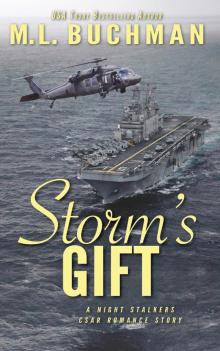 Storm's Gift
Storm's Gift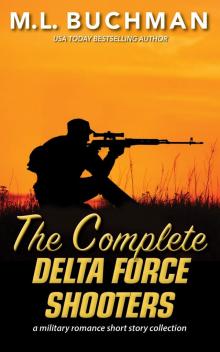 The Complete Delta Force Shooters
The Complete Delta Force Shooters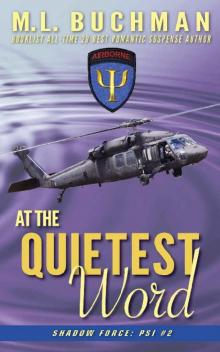 At the Quietest Word (Shadowforce: Psi Book 2)
At the Quietest Word (Shadowforce: Psi Book 2) At the Slightest Sound
At the Slightest Sound Dilya's Christmas Challenge
Dilya's Christmas Challenge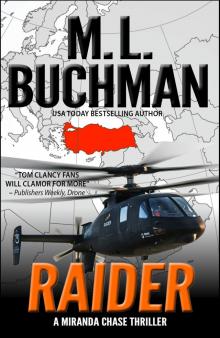 Raider
Raider Havoc
Havoc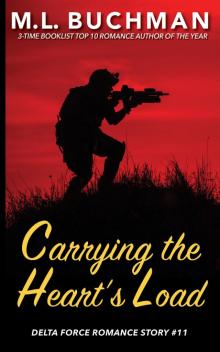 Carrying the Heart's Load
Carrying the Heart's Load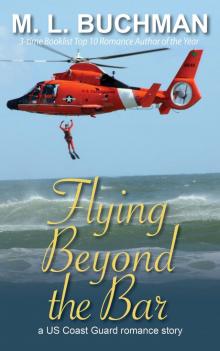 Flying Beyond the Bar
Flying Beyond the Bar Firelights of Christmas
Firelights of Christmas Where Dreams Are Well Done
Where Dreams Are Well Done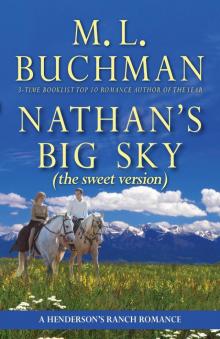 Nathan's Big Sky
Nathan's Big Sky Heart of a Russian Bear Dog
Heart of a Russian Bear Dog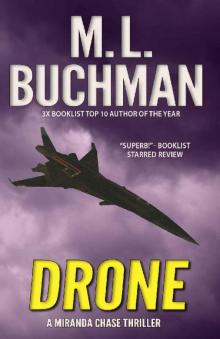 Drone: an NTSB / military technothriller (Miranda Chase Book 1)
Drone: an NTSB / military technothriller (Miranda Chase Book 1) Flower of Destiny
Flower of Destiny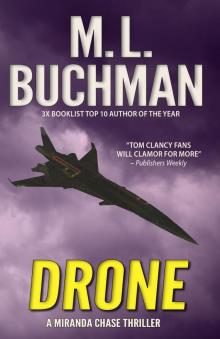 Drone
Drone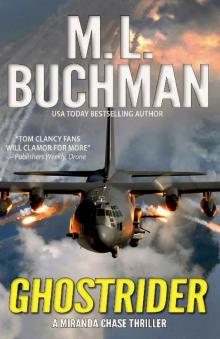 Ghostrider: an NTSB-military technothriller (Miranda Chase Book 4)
Ghostrider: an NTSB-military technothriller (Miranda Chase Book 4)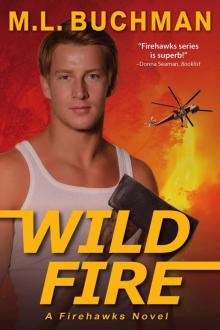 Wild Fire
Wild Fire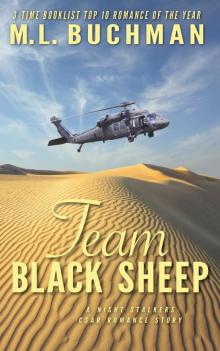 Team Black Sheep
Team Black Sheep The Complete Delta Force Warriors
The Complete Delta Force Warriors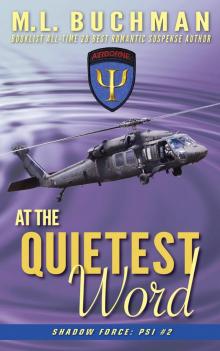 At the Quietest Word
At the Quietest Word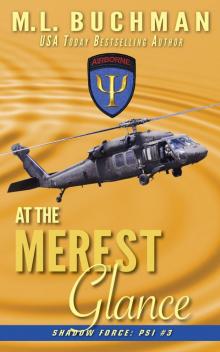 At the Merest Glance
At the Merest Glance Havoc: a political technothriller (Miranda Chase Book 7)
Havoc: a political technothriller (Miranda Chase Book 7) White Top: a political technothriller (Miranda Chase Book 8)
White Top: a political technothriller (Miranda Chase Book 8) Between Shadow and Soul
Between Shadow and Soul Island Christmas
Island Christmas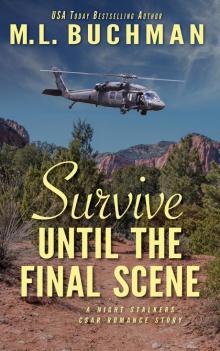 Survive Until the Final Scene
Survive Until the Final Scene Midnight Trust
Midnight Trust Return to Eagle Cove
Return to Eagle Cove Where Dreams Reside
Where Dreams Reside Honor Flight
Honor Flight Where Dreams Are Sewn
Where Dreams Are Sewn The Complete Hotshots
The Complete Hotshots Condor
Condor I Own the Dawn
I Own the Dawn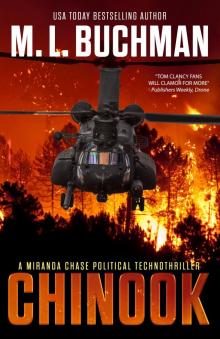 Chinook
Chinook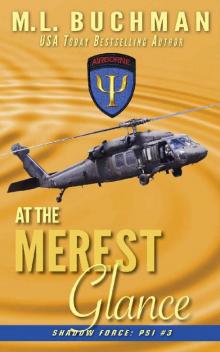 At the Merest Glance: a military paranormal romance (Shadowforce: Psi Book 3)
At the Merest Glance: a military paranormal romance (Shadowforce: Psi Book 3) Since the First Day
Since the First Day Thunderbolt: an NTSB / military technothriller (Miranda Chase Book 2)
Thunderbolt: an NTSB / military technothriller (Miranda Chase Book 2) For Her Dark Eyes Only
For Her Dark Eyes Only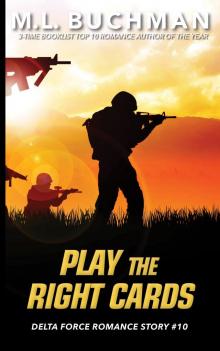 Play the Right Cards
Play the Right Cards Lost Love Found in Eagle Cove
Lost Love Found in Eagle Cove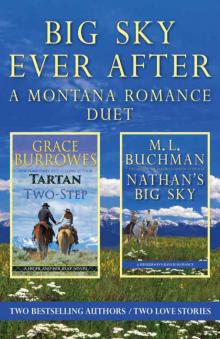 Big Sky Ever After: a Montana Romance Duet
Big Sky Ever After: a Montana Romance Duet Keepsake for Eagle Cove
Keepsake for Eagle Cove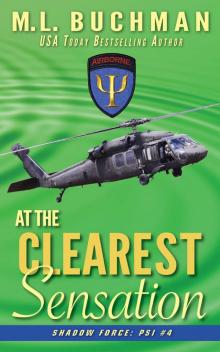 At the Clearest Sensation
At the Clearest Sensation The Ides of Matt 2015
The Ides of Matt 2015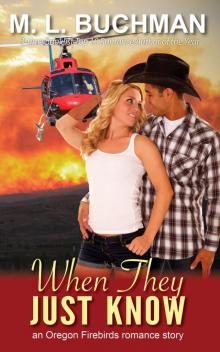 When They Just Know
When They Just Know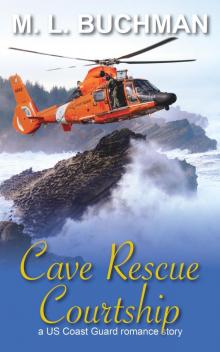 Cave Rescue Courtship
Cave Rescue Courtship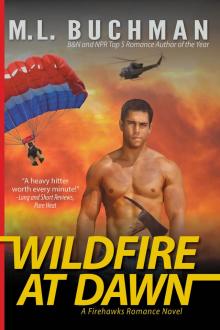 Wildfire at Dawn
Wildfire at Dawn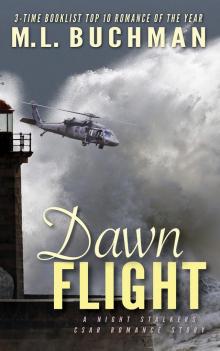 Dawn Flight
Dawn Flight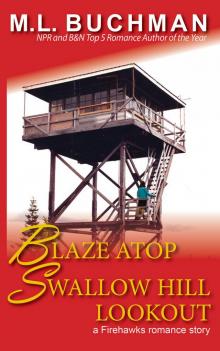 Blaze Atop Swallow Hill Lookout
Blaze Atop Swallow Hill Lookout The Sword of Io
The Sword of Io Christmas at Steel Beach
Christmas at Steel Beach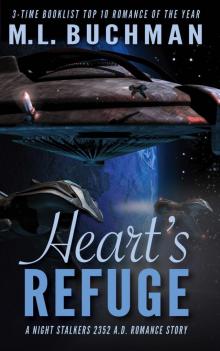 Heart's Refuge
Heart's Refuge By Break of Day (The Night Stalkers)
By Break of Day (The Night Stalkers)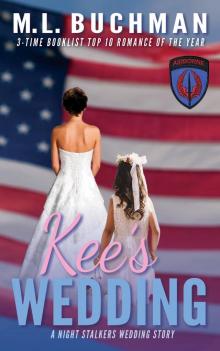 Kee's Wedding
Kee's Wedding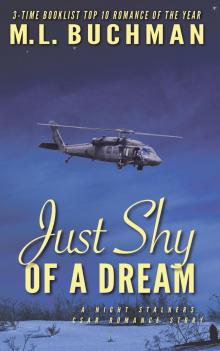 Just Shy of a Dream
Just Shy of a Dream Path of Love
Path of Love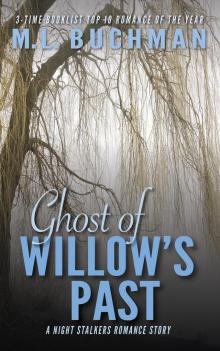 Ghost of Willow's Past
Ghost of Willow's Past Flash of Fire
Flash of Fire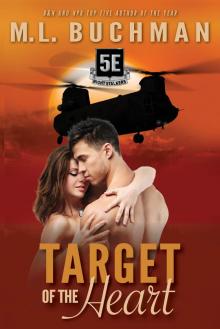 Target of the Heart
Target of the Heart Sound of Her Warrior Heart
Sound of Her Warrior Heart Target of Mine: The Night Stalkers 5E (Titan World Book 2)
Target of Mine: The Night Stalkers 5E (Titan World Book 2) The Complete Where Dreams
The Complete Where Dreams Target of One's Own
Target of One's Own For All Their Days
For All Their Days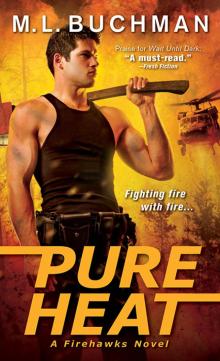 Pure Heat
Pure Heat Love's Second Chance
Love's Second Chance Target Engaged
Target Engaged Bring On the Dusk
Bring On the Dusk Wait Until Dark (The Night Stalkers)
Wait Until Dark (The Night Stalkers) Big Sky, Loyal Heart
Big Sky, Loyal Heart Welcome at Henderson's Ranch
Welcome at Henderson's Ranch Damien's Christmas
Damien's Christmas Flight to Fight
Flight to Fight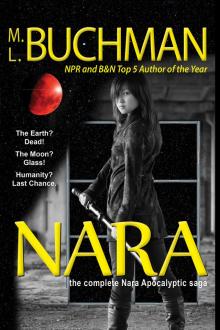 Nara
Nara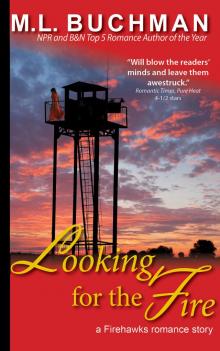 Looking for the Fire
Looking for the Fire Love Behind the Lines
Love Behind the Lines Peter's Christmas
Peter's Christmas In the Weeds
In the Weeds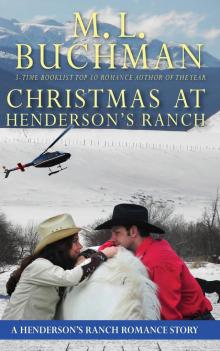 Christmas at Henderson's Ranch
Christmas at Henderson's Ranch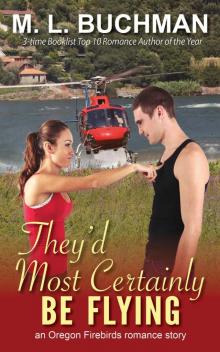 They'd Most Certainly Be Flying
They'd Most Certainly Be Flying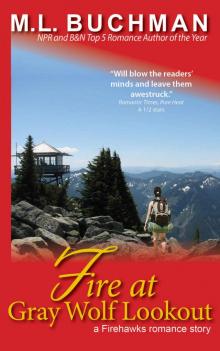 Fire at Gray Wolf Lookout (Firehawks Book 8)
Fire at Gray Wolf Lookout (Firehawks Book 8)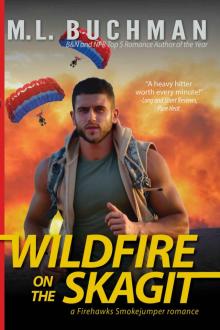 Wildfire on the Skagit (Firehawks Book 9)
Wildfire on the Skagit (Firehawks Book 9)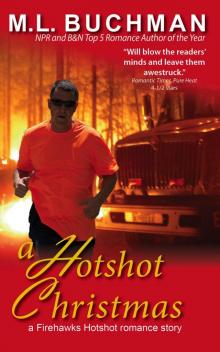 A Hotshot Christmas
A Hotshot Christmas Off the Leash
Off the Leash Where Dreams Books 1-3
Where Dreams Books 1-3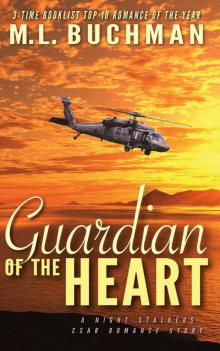 Guardian of the Heart
Guardian of the Heart The Ides of Matt 2017
The Ides of Matt 2017 Where Dreams Unfold
Where Dreams Unfold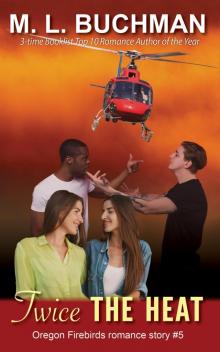 Twice the Heat
Twice the Heat Wild Justice (Delta Force Book 3)
Wild Justice (Delta Force Book 3) Flying Over the Waves
Flying Over the Waves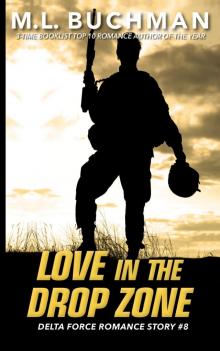 Love in the Drop Zone
Love in the Drop Zone I Own the Dawn: The Night Stalkers
I Own the Dawn: The Night Stalkers What the Heart Holds Safe (Delta Force Book 4)
What the Heart Holds Safe (Delta Force Book 4) The Christmas Lights Objective
The Christmas Lights Objective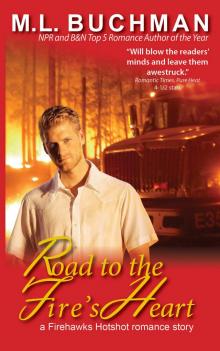 Road to the Fire's Heart
Road to the Fire's Heart Night Rescue
Night Rescue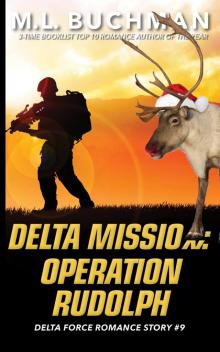 Delta Mission: Operation Rudolph
Delta Mission: Operation Rudolph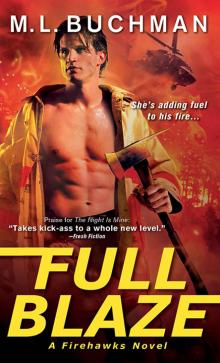 Full Blaze
Full Blaze Night Is Mine
Night Is Mine Lightning Strike to the Heart
Lightning Strike to the Heart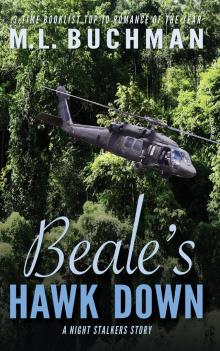 Beale's Hawk Down
Beale's Hawk Down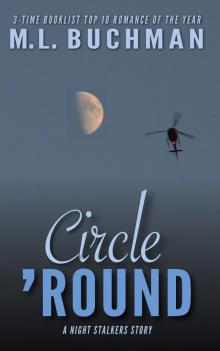 Circle 'Round
Circle 'Round Cookbook from Hell Reheated
Cookbook from Hell Reheated Zachary's Christmas
Zachary's Christmas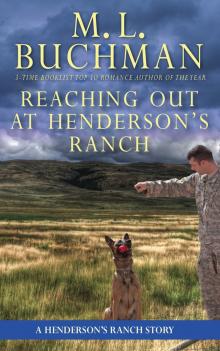 Reaching Out at Henderson's Ranch
Reaching Out at Henderson's Ranch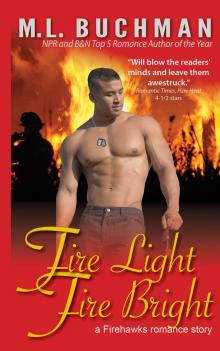 Fire Light Fire Bright
Fire Light Fire Bright The Ides of Matt 2016
The Ides of Matt 2016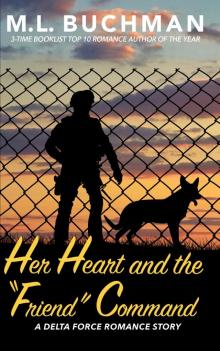 Her Heart and the Friend Command
Her Heart and the Friend Command On Your Mark
On Your Mark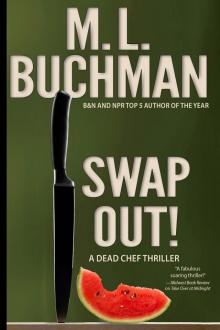 Swap Out!
Swap Out! Heart of the Cotswolds: England
Heart of the Cotswolds: England The Phoenix Agency_The Sum Is Greater
The Phoenix Agency_The Sum Is Greater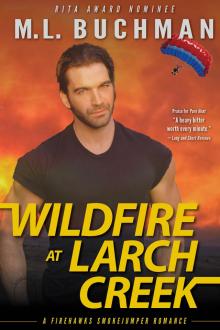 Wildfire at Larch Creek
Wildfire at Larch Creek Target Lock On Love
Target Lock On Love Second Chance Rescue
Second Chance Rescue Where Dreams Are Written
Where Dreams Are Written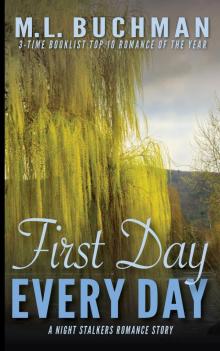 First Day, Every Day
First Day, Every Day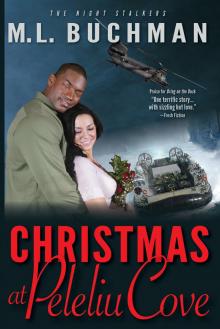 Christmas at Peleliu Cove
Christmas at Peleliu Cove Heart Strike
Heart Strike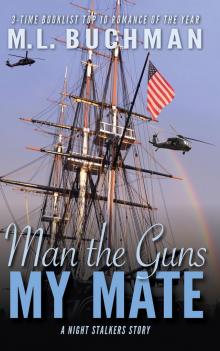 Man the Guns, My Mate
Man the Guns, My Mate Emily's Wedding
Emily's Wedding Daniel's Christmas
Daniel's Christmas Frank's Independence Day
Frank's Independence Day The Phoenix Agency: The Sum Is Greater (Kindle Worlds Novella)
The Phoenix Agency: The Sum Is Greater (Kindle Worlds Novella) Roy's Independence Day
Roy's Independence Day